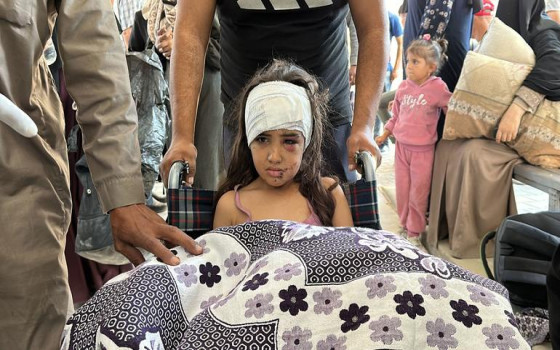
Gaza: UN grave concern over reports of rising Palestinian deaths and injuries.. Lebanon: Deterioration of the humanitarian situation exceeds the severity of the 2006 war

- Europe and Arabs
- Tuesday , 5 November 2024 7:56 AM GMT
Gaza - Beirut: Europe and the Arabs
The United Nations Office for the Coordination of Humanitarian Affairs (OCHA) expressed deep concern over the continuing reports of rising Palestinian casualties, particularly in the northern Gaza Strip, where Israeli military operations continue. According to the UN daily news bulletin, a copy of which we received this morning, Tuesday.
At the same time, OCHA reported that over the past month, the Israeli authorities have only allowed humanitarian access to Jabalia, Beit Lahia and Beit Hanoun on an exceptional basis, "which leaves us unable to confirm the conditions of people inside and we are concerned for their safety." OCHA warned that the already limited humanitarian supplies entering Gaza have dwindled further since October. Private imports are effectively banned, and the Israeli authorities only allow the use of three entry points - Kerem Shalom, Gate 96, located near Deir al-Balah, and Erez West (Beit Hanoun).
Moreover, OCHA reported that these border areas are only accessible through extremely dangerous roads. Most of the roads leading to these points have been blocked by the Israeli authorities or have become unsafe due to ongoing hostilities. The roads that are available are often in poor condition and vulnerable to armed looting fuelled by the breakdown in public order and safety.
Humanitarian workers have noted that supplies arriving at the northern crossing at Erez West can only be sent to Gaza City, with requests to deliver them to besieged areas in the northern Gaza Strip consistently denied.
The World Food Programme has warned that as winter approaches, shortages of food and other vital humanitarian supplies entering the Gaza Strip could spiral into famine unless immediate action is taken. In October, WFP said it had only been able to reach 42 per cent of the 1.1 million people targeted for food assistance in Gaza, with food rations falling due to reduced levels of aid.
Separately, the World Health Organization’s representative in the occupied Palestinian territory, Rick Peeperkorn, highlighted the dire health situation and the polio vaccination campaign in northern Gaza. He briefed journalists at UN headquarters in New York on Monday via video from Deir al-Balah in central Gaza. Dr. Peeperkorn, who has just returned from a mission to northern Gaza, highlighted what he described as the dire situation in three hospitals in northern Gaza, namely Al-Awda, Kamal Adwan and the Indonesian Hospital, stating that the Indonesian Hospital is not functioning, while Al-Awda and Kamal Adwan Hospitals are partially functioning.
He said that WHO faced challenges in implementing humanitarian missions during October, noting that many of these missions were either cancelled or hindered. However, Dr. Peeperkorn said that the organization had successfully completed seven missions during the past three weeks.
In Lebanon, the United Nations Office for the Coordination of Humanitarian Affairs warned that the humanitarian situation in Lebanon had reached levels “exceeding the severity of the 2006 war amid escalating hostilities.”
In a press conference held in New York on Monday, UN spokesman Stephane Dujarric said that the health sector across the country “continues to face relentless attacks, with staff, facilities and resources increasingly caught in the crossfire, further straining Lebanon’s already fragile health infrastructure.” On Sunday, an Israeli airstrike near Tebnine Hospital in Bint Jbeil district caused extensive damage to the hospital, injuring dozens of people, while another airstrike near Baalbek Hospital caused extensive damage to the facility.
According to the World Health Organization, 110 health care workers have been killed in the line of duty since October last year. The organization noted that there have been at least 60 attacks on health care facilities in the past 13 months.
Mr. Dujarric expressed the organization’s deep concern about the increasing impact of hostilities on civilians, as Israeli airstrikes continue to rain down on Lebanon, Hezbollah continues to fire drones and rockets into Israel, and direct clashes between the two parties continue in the south of the country as the Israeli army continues its ground operations.
The UN spokesman said: “We condemn the loss of civilian lives. All actors must abide by international law and protect civilians and civilian infrastructure.” On the humanitarian front, UNRWA delivered medical supplies and generator fuel to the Burj al-Shamali Palestinian refugee camp in Tyre, while UNICEF distributed emergency supplies, including hygiene and dignity kits, to displaced people in other parts of the southern city.
In the Baalbek-Hermel area, a humanitarian convoy carrying food and hygiene kits reached displaced people in a collective shelter, and another convoy carrying medical supplies reached a primary health care centre in Labweh.
UNIFIL installations continue to be affected by the hostilities, with the UN spokesperson confirming that a UN site near the town of Markaba sustained damage to its prefabricated containers and its surroundings on Saturday due to nearby Israeli demolitions. He added that another explosion near UNIFIL’s headquarters in Naqoura also damaged a UN vehicle, with no injuries reported.
“We once again remind all actors of the inviolability of UN premises and their responsibility to protect UN peacekeepers,” Mr. Dujarric said.












No Comments Found